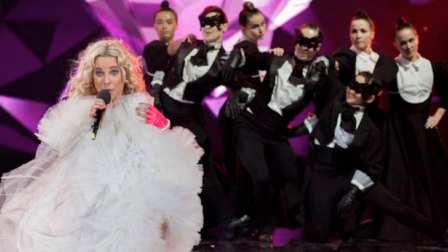While the period between the end of the National Finals and the start of rehearsals is generally considered a quiet time for Eurovision fans (beyond those lucky few who make it out to the preview shows in Amsterdam and London), for the delegations there’s an absolute flurry of activity that goes on behind the scenes.
Songs can be tweaked, translated, and remixed, and brows from Reykjavík to Tel Aviv will furrow as proper camera angles, lighting techniques, and special effects are selected, and the production team at SVT informed. Pyrotechnics? Wind Machines? Costume changes? Translucent pianos? All of the above? While honing a stage show is a major part of the Eurovision process, delegations have to strike a delicate balance between heightening the appeal of an entry and simply going overboard and risking ruining a good thing.
The objective is simple… to create a three-minute block of entertainment that will stick in a viewer’s (and potential voter’s) mind, highlight the mood and tempo of the song, but not go so completely off-the-rails that people will roll their eyes as the recap comes through. In a year where the songs are as seemingly evenly-matched as this one, a simple gimmick, a touch of choreography, or a properly-placed curtain of sparks can turn a middle-of-the-road entry into a potential champion (yes, I’m looking at you, ‘Running Scared‘). On the other hand, a poor choice of remix, a misguided outfit, or trying to over-egg the pudding by simply doing too much can ruin a potential pre-contest favorite’s chances.
One of the hot favorites going into the 2011 contest was France’s Amaury Vassili. The Corsican-language opera number “Sognu” was seen as a treat for the eyes and ears when the studio version was released in March of 2011. (In all honesty, the Insight team had our hotel next door to the Paris-Bercy already booked). However, when Amaury took the stage for his rehearsals in Düsseldorf, we found that his people had decided to lower the song’s key.
In a perfect world, maybe this would have made ‘Sognu‘ appear more brooding and dramatic. After all, it was a song about love and loss. However, that key change dulled some of France’s shine that year, and Amaury’s technical issues on the night (supposedly he was unable to hear himself through his earpiece) were almost a coup-de-grace for the song’s chances, despite a stunning visual.
Amaury’s successor, Anggun, might not have been tipped as highly in the betting in Baku as her predecessor had been, but ‘Echo (You and I)‘ seemed to have the full package going for it. A stunningly gorgeous performer with years of experience, to be decked out in a custom-made Jean-Paul Gaultier dress, singing a fun, danceable entry with a hook in English that could likely lend to its universality… what’s not to love?
But when Anggun came to Azerbaijan, the stage show was overwhelming and chaotic. Shirtless back-flipping gymnasts and overwrought choreography ended up detracting from what could have been something truly special (and it’s rare for me to admit that a shirtless back-flipping gymnast would detract from any situation), and Anggun ended up hovering near the bottom of the scoreboard, with ‘nul points’ from the public.
Let’s Do Some Before And After
That same year, veteran Croatian diva Nina Badrić released “Nebo” after HRT picked her via internal selection. When the entry was presented in February, the staging was subtle, her outfit elegant (and perfectly fitting with the theme of “heaven” presented in the song), and the arrangement was dramatic enough to hold the audience’s attention.
The National presentation…
…and the official preview.
When the official video came out, the key was lowered, and the arrangement made more string-focused and subtle. It lost a bit of the pow of the original, but there was still something there. When she came to Baku, though, not only was the newer arrangement put in place, but it was revealed that Nina would be wearing a mulleted bin bag that really did her no justice. Rather than looking angelic, as she did during the song’s premiere, the visual connection to the heavenly theme was lost, as was the musical impact of the original. Nina ended up failing to qualify.
It’s hard to say whether the original arrangement and staging would have been more effective, since what has passed has passed, but from the general fan and critical reaction, the first version of “Nebo” was the most favorably-received, and likely may have had a better impact on the scoreboard. (And, on a scoreboard where only four more points would have secured her place in the Final, a slight breeze could have potentially changed that outcome.)
…And The Kitchen Sink
A similar fate befell Belarus’s Litesound in 2012. After last year’s scandal at Eurofest, when voting irregularities and allegations of cheating plagued the selection, it was eventually decided that ‘We Are the Heroes‘, a pop-rock sound that was very much in line with the Karyakin brothers’ style, would head to Baku instead of Alyona Lanskaya’s ‘All My Life’. However, the delegation (and not the band itself) decided that a remix and a change of image would be in order for May, and after being reworked by Greek producer Dimitris Kontopoulos, the song was changed from a guitar-driven number to pure electropop. Motorcycle jackets were dropped in favor of chain-mail and guyliner, and the five-member band ended up having to mime playing guitars that weren’t even present in the new mix. Despite years of trying to make it to Eurovision, what was presented in Azerbaijan was simply not Litesound’s original vision of “We Are the Heroes”, and, like Nina, they failed to qualify from their Semifinal.
When It Works, It Works
Don’t get me wrong; there are definitely cases where throwing in the kitchen sink can work perfectly with the tone of a song. Some countries have cornered the market on this technique: most notably, Moldova and Ukraine. If France had rolled out a piston-pumping Hell Machine or Unicycle Fairy Princess, viewers would have thought it was ridiculous. However, knowing that the same nations that gave us Svetlana Loboda and Zdob şi Zdub also gave us Pasha Parfeny’s madcap clockwork dancers and Mika Newton’s sand artist…we simply shrug and go “well, they’ve found a niche, haven’t they?
Also, when a song tends towards the offbeat, you logically need to have a presentation to go with it. ‘Pokusaj’s‘ drying laundry and knitting brides? Makes sense to me! ‘Euro Neuro’s‘ Trojan Donkey? Sure, why not? When San Marino played into the ridiculousness of ‘The Social Network Song‘ by adding the Serenissima Repubblica’s answer to The Village People as backing dancers, it made sense. It’s all about finding that equilibrium.
There are a few entries this year that come to mind as I write this article. There are songs that may seem great at the national final or studio level, but have the potential to go wonky if certain production decisions are made. For example, despite Ukraine’s aforementioned history of epic stage shows being used to great effect, if too overwhelming of a gimmick is used, could the vocal prowess of Zlata Ognevich’s “Gravity” be overshadowed?
On the other hand, there have already been improvements made in entries from their original reveal to now. Belgium, in particular, was panned by fans when ‘Love Kills‘ was picked in a rare radio Final in December. But a new mix, a few English lessons, and not having to perform at ten o’clock on a Sunday morning have helped Roberto Bellarossa along quite a bit. However, if they decide to add magic tricks or over-the-top costumes, it could all fall flat once more.
On the other side of the coin, songs like ‘Igranka‘ and ‘Marry Me‘ are offbeat and original enough that they can take a touch of the off-the-wall without losing a significant amount of their shine. In fact, without that off-the-wall factor, they could easily lose the charm they already have.

Oh I’m sorry, did I interrupt your interview?
Delegations have a major challenge in front of them as they try to make their presentations in Malmö memorable, preferably for all the right reasons. Some ideas that may seem bizarre on paper work out brilliantly (“Let’s have Loreen’s backup dancer emerge silently from the falling snow, and the two of them will proceed to do a tai-chi-meets-capoeira pas-de-deux!”), while others simply look overeager and borderline desperate (“Let’s have Sakis convulse like someone on a defibrillator while he rides atop a giant glowing stapler emblazoned with the Greek flag!”). A song has the potential to become magical or a mockery, depending on what goes on stage with it.
For fans who have an image in their heads of a song from their national final or official preview video, that uncertainty often adds to what we love about Eurovision in the first place.











Cracking post as always, Samantha.
“Let’s have Sakis convulse like someone on a defibrillator while he rides atop a giant glowing stapler emblazoned with the Greek flag!”
Very nice. 🙂
Lowering the key to make it easier for the performer to sing is one of my pet hates in Eurovision! It almost always seriously lessens the impact of the song. But amazingly, it seems like most Euro fans don’t notice, or don’t care, because I rarely see it discussed.
Litesound was another example of them doing this, and I think that was a bigger problem that the new backing track – watch the music video which is in the original, higher key – it’s actually pretty good.
Other examples – Charlotte Perrelli, whose lower key version of Hero sounded dreadful. Dima Bilan I thought actually might have blown his chances with the lower key version of “Believe”, but obviously that was one example where it didn’t seem to matter.
From this year, it looks like Finland are doing it (though it’s the same key as the winning national final performance so might not be a massive problem), but have also now heard Dina Whatshersface sing her song twice in a lower key and I think it sounds awful. I think this harms her chances of winning massively.